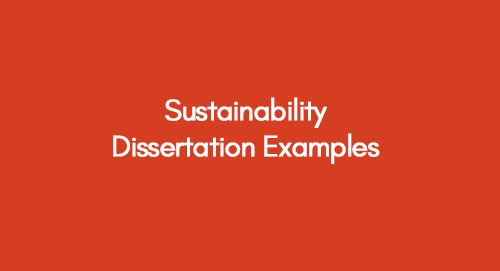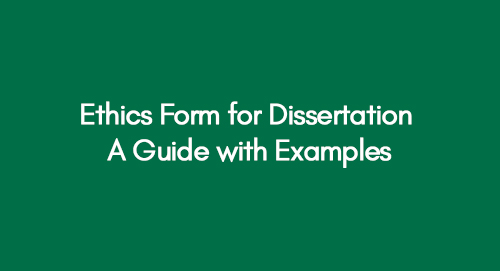
175 Best Quantity Surveying Dissertation Topics in 2025
May 2, 2023
Free Top Construction Dissertation Examples For Students
May 3, 2023Sustainability is about living and operating within the planet's natural systems and limits. This involves reducing human use of non-renewable resources, minimising waste and pollution, and promoting social equity and justice.
It is a complex and multifaceted concept that applies to various contexts, from individual lifestyles and consumer choices to business operations and government policies. Ultimately, it requires a long-term view prioritising the health and well-being of both people and the planet.
Undoubtedly, sustainability is a more valuable field of study and plays a critical role in any aspect of life. Students and researchers have many career opportunities to contribute significantly to this field.
Get 3+ Free Sustainability Dissertation Topics within 24 hours
View Our Quality Environment and Sustainability Dissertation Topics
Here are top sustainability dissertation examples to assist students and researchers in drafting their high-quality research papers.
Example 1: Development of Sustainable Homes Through Renewable Energy Sources
Example 2: Rise of Smart Airports in African Aviation Industry
Note: Below is a complete guide with some more examples and tips for you to ace the skill of dissertation writing in sustainability.
What is Sustainability Dissertation?
A sustainability dissertation is an academic research effort focusing on environmental, social, and economic sustainability issues. It seeks to investigate and propose creative solutions to the world's difficulties to create a more sustainable future.
Environmental conservation, natural resource management, sustainable economic practices, and social justice are among the issues addressed in the dissertation.
We have compiled a list of sustainability dissertation topics for students and researchers to help them choose the most appropriate topic for their degree.
Sustainability Dissertation Examples
Sustainability is becoming increasingly popular, and many students want to make a positive contribution to the field. Here they get amazing examples and ideas for their sustainability dissertation.
Bachelor Sustainability Dissertation Examples
- An Analysis of the Environmental Impact of Sustainable Agriculture Practices
- Evaluating the Effectiveness of Corporate Social Responsibility (CSR) in the Fashion Industry
- Investigating the Potential of Renewable Energy Sources in Developing Countries
- A Comparative Analysis of Waste Management Strategies in Developed and Developing Countries
- Examining the Impact of Sustainable Tourism on Local Communities and Ecosystems
- Assessing the Feasibility of Implementing Circular Economy Practices in the Construction Industry
Master Sustainability Dissertation Examples
- An Analysis of the Environmental and Social Impacts of Urbanization
- Investigating the Challenges and Opportunities of Sustainable Supply Chain Management
- Analysing the Economic and Environmental Benefits of Energy Efficiency in Buildings
- Examining the Role of Renewable Energy in Meeting Sustainable Development Goals
- Assessing the Effectiveness of Corporate Sustainability Reporting
- Investigating the Potential of Natural Capital Accounting for Promoting Sustainability
PhD Sustainability Dissertation Examples
- An Investigation of the Environmental and Social Impacts of Climate Change
- Investigating the Role of Sustainable Agriculture in Climate Change Mitigation
- Examining the Impact of Environmental Policies on Corporate Sustainability Performance
- Analysing the Potential of Circular Economy in Promoting Sustainable Consumption and Production
- Assessing the Potential of Climate-Smart Cities in Promoting Urban Sustainability
- Investigating the Impact of Sustainable Business Models on Social and Environmental Outcomes
Let’s Draft Your Sustainability Dissertation
The structure of a sustainability dissertation may vary depending on the specific research topic. However, a typical and effective draft could include the following components:
How to Structure and Format a Table of Contents for Your Dissertation?
Introduction
An introduction to the sustainability topic is crucial to the dissertation writing process and serves as a roadmap for the rest. It provides background information on the dissertation topic, establishes its relevance and importance, and clearly states the research question or issues.
Abstract
Your abstract for dissertations is the main and most focused part of the research paper. This dissertation overview provides an overview of your research question, methodology, findings, and conclusions.
Literature review
The literature review provides an overview of the existing research on your topic and identifies gaps in knowledge that your research aims to address. When you write a literature review, you compress more knowledge and provide brief information to the reader.
Methodology
It's the most interesting part of dissertation writing, but you need to describe how you conducted your research, collected data, and analysed the data in your study. It should also explain why research methods were chosen and discuss any limitations.
Discussion
This section interprets your dissertation paper results about its specific question or hypothesis. It also considers the implications of your findings for theory, practice, and policy.
Conclusion
This part of your dissertation contains the conclusion you have drawn from your research which is a major task. This section aims to summarise the main findings of your study, highlight your study's contribution to the field, and summarise areas where further studies are needed.
Sustainability Dissertation Example: A Case Study
Topic: Investigating the Impact of Sustainable Business Models on Social and Environmental Outcomes
Abstract
As concerns over environmental degradation and social inequalities mount, businesses increasingly seek ways to adopt more sustainable practices. This dissertation investigates the impact of sustainable business models on social and environmental outcomes. The qualitative case studies provide more detail on the challenges and opportunities of sustainable business models, drawing on interviews with managers and stakeholders from various industries. The case studies highlight the importance of stakeholder engagement, effective communication, and innovative business models in achieving sustainable outcomes. The dissertation highlights the potential of sustainable business models to deliver social and environmental benefits while identifying the key challenges and barriers that must be overcome. The findings have significant implications for business strategy and policy, providing insights into how sustainability integrates into business models and the potential benefits realised.
Literature Review
The literature on sustainable business models grows rapidly, reflecting the increasing recognition of businesses' role in promoting social and environmental sustainability. This literature review provides an overview of the key concepts and theoretical frameworks that underpin the study of sustainable business models and highlights existing research on the impact of these models on social and environmental outcomes.
Methodology
This dissertation investigates the impact of sustainable business models on social and environmental outcomes. A mixed-methods approach combines quantitative analysis with qualitative case studies. Quantitative analysis involves secondary data analysis of a large dataset of over 1000 firms from various industries. Qualitative case studies examine multiple businesses from different industries that adopt sustainable business models. The results from both will be integrated through a triangulation process to provide a more comprehensive understanding of the impact of sustainable business models on social and environmental outcomes.
Conclusion
This dissertation investigates the impact of sustainable business models on social and environmental outcomes. The findings of this study suggest that sustainable business models can positively impact both social and environmental outcomes, such as carbon emissions, waste reduction, employee satisfaction, and customer loyalty. Further research is needed to explore the mechanisms that facilitate or hinder sustainable practices. In addition, it needs to identify the conditions under which sustainable business models are most effective.
Final Thought
This sustainability dissertation writing guide provides a comprehensive framework for students and researchers to structure and write their sustainability dissertations. It covers the key components of a sustainability dissertation, including the introduction, literature review, methodology, findings, and conclusion. It emphasises the importance of a clear and concise writing style and ethical considerations in sustainability research. By following the guidance, students and researchers can produce well-crafted, rigorous, and impactful sustainability dissertations that contribute to the broader goal of creating a more sustainable future.





















